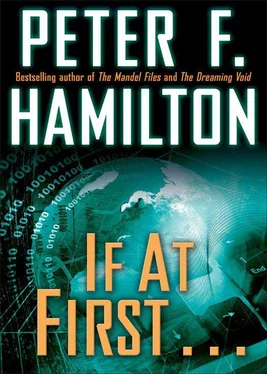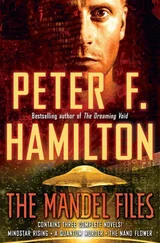Peter F. Hamilton
IF AT FIRST…
MY NAME IS David Lanson, and I was with the Metropolitan Police for twenty-seven years. When we got handed the Jenson case I was a chief detective, heading up my own team. Not bad going; from outside you’d think I was a standard careerist ticking off the days until retirement. You’d be wrong, I’d grown to hate the job with a passion. Back when I signed on the CID were real thief-takers, but by the time the Jenson case came up I was spending all my time filling in Risk Assessment forms. I’m not kidding, the paperwork was beyond parody. All good stuff for lawyers, but we were getting hammered in the press for truly dismal crime statistics, and hammered by the politicians for not meeting their stupid targets. No wonder public confidence in us had reached rock bottom; the only useful thing we did for the average citizen by then was to hand out official crime numbers for insurance claims.
I suppose that makes me sound bitter; but then that seems to be the fate of old men who’re stuck in a job that’s forever modernizing. The point of all this being, despite drowning in all that bureaucratic stupidity I reckoned I was quite a decent policeman. That is: I know when people are lying. In those twenty-seven years I’d heard it all, and I do mean all: desperate types who’ve made a mistake and then start sprouting bollocks to cover themselves, the genuine nutters who live in their own little world and believe every word they’re saying, drunks and potheads trying to act sober, losers with pitiful excuses, real sick ones who are so cold and polite it makes my skin crawl. Listening to all that day in day out you soon learn to tell what’s real and what isn’t.
So anyway— We get the call from Marcus Orthew’s solicitor that his security people are holding an intruder at his Richmond research center, and they’d appreciate a full investigation of the “situation.” That was in 2007, and Orthew was a media and computer mogul then, at least that was the public perception; it wasn’t until later I found out just how wide his commercial and technological interests were. His primary hardware company, Orthanics, had just started producing solid state blocks that were generations ahead of anything the opposition were doing, they didn’t have hard drives or individual components, the entire computer was wrapped up inside a single hyperprocessor. It wiped the floor with PCs and Applemacs. He was always ahead of the game, Orthew; it was his original PCWs that blew Sinclair computers away at the start of the 1980s; everyone in my generation went and bought an Orthanics PCW as their first computer.
But this break-in: I thought it was slightly odd the solicitor calling me rather than the company security office. Like I said, the longer you’re in the game you develop a feeling for these things. I took Paul Mathews and Carmen Galloway with me, they were lieutenants on my team, good people, and slightly less bothered about all the paperwork flooding our office than me. Smart move, I guess; they’d probably make it farther than I was ever destined to go. Orthanics security were holding on to Toby Jenson, they’d found him breaking into one of the Richmond Center labs, which the CCTV footage confirmed. And I was right, there was more to it. We read Toby Jenson his rights, and uniform division hauled him off; that was when the solicitor told me he was a stalker, a twenty-four-karat obsessive. Marcus Orthew had known about him for years, Jenson had been following him ’round the globe, hacking into Orthew’s systems, talking to people in his organization, on his domestic staff, ex-girlfriends, basically anyone who crossed his path; but they hadn’t been able to do anything about him. Jenson was smart, there was never any activity they could take him to court for, he never got physically close, all he did was talk to people, and the hacking could never be proved in law. The Richmond break-in changed all that. As it was Orthew making the allegations, my boss told me to give it complete priority; I guess she was scared about what his magazines and satellite channels would do to the Met if we let it slide.
I went out to Jenson’s house with Paul and Carmen. Jesus, you should have seen the bloody place: I mean it was out of a Hollywood serial killer film. Every room was filled with stuff on Orthew; thousands of pictures taken all over the world, company press releases dating back decades, filing cabinets full of newspaper clippings, articles, every whisper of gossip, records of his movements, maps with his houses and factories on them, copies of his magazines, tapes of interviews Jenson had made, City financial reports on the company. It was a cross between a shrine and a Marcus Orthew museum. It spooked the hell out of me. No doubt about it, Jenson was totally fixated on Orthew. Forensics had to hire a removal lorry to clear the place out.
I interviewed Jenson the next day, and that was when it started to get really weird. I’ll tell you it as straight as I can remember, which is pretty much verbatim, I’m never ever going to forget that afternoon. First off, he wasn’t upset that he’d been caught, more like resigned. Almost like a premier league footballer who’s lost the Cup Final, you know: It’s a blow but life goes on. The first thing he said was: “I should have realized. Marcus Orthew is a genius, he was bound to catch me out.” Which is kind of ironic, really, isn’t it? So I asked him what exactly he thought he’d been caught out doing. Get this: He said, “I was trying to find where he was building his time machine.” Paul and Carmen just laughed at him. To them it was a Sectioning case, pure and simple. Walk the poor bloke past the station doctor, get the certificate signed, lock him up in a padded room, and supply him with good drugs for the next thirty years. I thought more or less the same thing, too; we wouldn’t even need to go to trial, but we were recording the interview, and all his delusions would help coax a signature out of the doc, so I asked him what made him think Orthew was building a time machine. Jenson said they went to school together, that’s how he knew. Now, the thing is, I checked this later, and they actually did go to some boarding school in Lincolnshire. Well that’s fair enough, obsessions can start very early, grudges, too; maybe some fight over a bar of chocolate spiraled out of control, and it’d been festering in Jenson’s mind ever since. Jenson claimed otherwise. Marcus Orthew was the coolest kid in school, apparently. Didn’t surprise me; from what I’d seen of him in interviews over the years he was one of the most urbane men on the planet. Women found that very attractive, you didn’t have to look through Jenson’s press cuttings to know that, Orthew’s girlfriends were legendary, even the broadsheets reported them.
So how on earth did Jenson decide that the coolest kid in school had evolved into someone building a time machine? “It’s simple,” he told us earnestly. “When I was at school I got a cassette recorder for my twelfth birthday. I was really pleased with it, nobody else had one. Marcus saw it and just laughed. He snatched one of the cassettes off me, a C-90 I remember, and he said: State of the art, huh, damn it’s almost the same size as an iPod. ”
Which didn’t make a lot of sense to me. Paul and Carmen had given up by then, bored, waiting for me to wrap it up. So? I prompted. “So,” Jenson said patiently. “This was 1971. Cassettes were state of the art then. At the time I thought it was odd, that iPod was some foreign word; Marcus was already fluent in three languages, he’d throw stuff like that at you every now and then, all part of his laid-back image. It was one of those things that lingers in your mind. There was other stuff, too. The way he kept smiling every time Margaret Thatcher was on TV, like he knew something we didn’t. When I asked him about it he just said one day you’ll see the joke. I’ve got a good memory, Detective, very good. All those little details kept adding up over the years. But it was the iPod that finally clinched it for me. How in God’s name could he know about iPods back in ’71?”
Читать дальше












